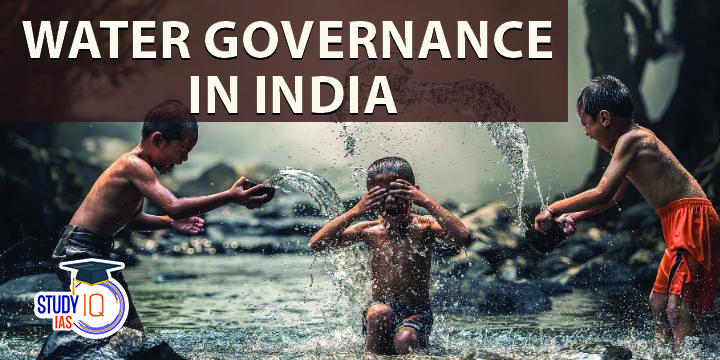Table of Contents
Water Governance in India
- Article 21 of the constitution: Right to clean drinking water.
- Water has been deemed a fundamental resource and the Centre and States have been tasked to make Water Governance Policies to distribute water among people.
|
Water: Union List vs State List |
|
| Union List | State List |
Article 246 grants the Central government the exclusive power to make laws on the following subjects under List I of the Seventh Schedule
|
States are Empowered to:
|
- State Vs Union: States like Tamil Nadu, Kerala, Karnataka have complained of inadequate disbursal of funds by Centre, claiming that the delay has caused stalling of important dam projects.
- Inter-State Dispute: Development of water supplies, canals and riverbanks is an area of conflict between States. India’s major river disputes:
- Cauvery dispute (Karnataka-Tamil Nadu)
- Sutlej-Yamuna Link Canal (Punjab-Haryana)
- Polavaram project dispute (Andhra Pradesh-Telangana)
- Krishna Water Disputes Tribunal II (2004) – Karnataka, Telangana, Andra Pradesh, Maharashtra
- Mahanadi Water Disputes Tribunal (2018) – Odisha & Chattisgarh
- Mahadayi Water Disputes Tribunal (2010) – Goa,Karnataka, Maharashtra
- Ravi & Beas Water Tribunal (1986) – Punjab, Haryana, Rajasthan
- Vansadhara Water Disputes Tribunal (2010) – Andra Pradesh & Odisha.

Inter-State River Water Dispute Act, 1956
- It governs inter-State river disputes in India.
- Any State may request the Centre to refer an inter-State river dispute to a tribunal for adjudication.
- Centre government may setup such a Water Disputes Tribunal within one year of the complaint.
- The tribunal must decide on the dispute within three years, which may be extended by two years.
- All decisions of the Tribunal are final and binding, as decision has the same force as an order of the Supreme Court.
Inter-State River Water Disputes Amendment Bill, 2019
- It was introduced in Lok Sabha in 2019.
- It amends the Inter-State River Water Disputes Act, 1956.
- The Act provides for the adjudication of disputes relating to waters of inter-state rivers and river valleys.
- Bill is yet to be passed in the Parliament.
State-level Water Governance
- Each State government forms laws for water management across its districts.
- Aim: To regulate water usage by industries, set rules for water treatment, set water tariffs and manage sewage water generated.
- Example: Haryana Water Resources (Conservation, Regulation and Management) Authority Act, 2020 is the example of such an act which constitutes an authority to fix tariffs for all uses of water and set rules for the use & disposal of treated wastewater.
- Some states like Andhra Pradesh and Kerala have passed irrigation and water conservation laws to stop river pollution, specify limits on water supply for irrigating crops and penalize those who violate these norms.
Local-level Water Governance: To provide tapped water to all rural and urban households falls under the purview of the various civic bodies managed by the state governments.
Jal Jeevan Mission (JJM)
- Aim: To provide a Functional Household Tap Connection (FHTC) to every rural household by 2024, in collaboration with States and Union Territories (UTs).
- To develop bulk water transfer facilities, treatment plants and a robust in-village water distribution network.
- Funding: Outlay of Rs 3.60 lakh crore, the Centre has pledged a contribution of 100% funds for UTs without a legislature, 90% for North Eastern and Himalayan States/UTs and 50% for other states.
- Status: States like Goa, Telangana and Haryana and UTs like Andaman & Nicobar Islands, Puducherry, Dadra & Nagar Haveli and Daman & Diu have achieved 100% tap water connections.


 Bihu Festival and Dance of Assam, Histor...
Bihu Festival and Dance of Assam, Histor...
 World Heritage Day 2025, Theme, Objectiv...
World Heritage Day 2025, Theme, Objectiv...
 Indian Councils Act 1861, History, Provi...
Indian Councils Act 1861, History, Provi...





















